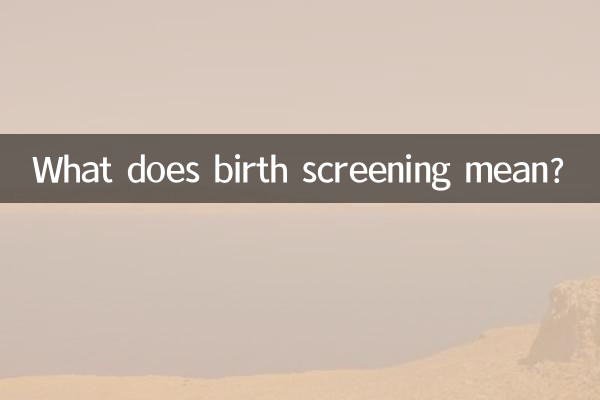What does birth screening mean?
Recently, the term “prenatal screening” has been widely discussed on social media and in the medical and health fields. Many netizens have questions about the specific meaning, importance and related processes of "production screening". This article will combine the hot topics and hot content on the Internet in the past 10 days to explain in detail the definition, meaning and related data of "production screening" to help you fully understand this important concept.
1. Definition of production screening

Prenatal screening, the full name of "prenatal screening", refers to the health assessment of pregnant women and their fetuses through a series of medical examinations and technical means to early detect possible genetic diseases, developmental abnormalities or other health risks. The purpose of prenatal screening is to protect the health of mother and baby and intervene or treat possible problems in advance.
2. The importance of production screening
With the advancement of medical technology and people's increasing awareness of health, prenatal screening has become an important part of modern maternal health care. The following are the main significance of production screening:
1.Detect risks early: Through prenatal screening, possible chromosomal abnormalities (such as Down syndrome), congenital heart disease and other diseases in the fetus can be detected early.
2.guide follow-up intervention: Based on the results of prenatal screening, doctors can develop personalized intervention plans, such as further diagnosis, treatment or pregnancy management.
3.Reduce family burden: Early detection and treatment of problems can reduce the financial and psychological burden on families caused by illnesses after the birth of their children.
3. Main items of production screening
The following are common prenatal screening items and their brief descriptions:
| Project name | Check content | suitable time |
|---|---|---|
| NT check | Measure the thickness of the fetal nuchal translucency through B-ultrasound to assess the risk of chromosomal abnormalities | 11-14 weeks pregnant |
| Down syndrome screening | Assess the risk of Down syndrome through blood tests combined with maternal age, weight, etc. | 15-20 weeks pregnant |
| Non-invasive DNA testing | Analysis of fetal DNA through maternal peripheral blood to screen for chromosomal abnormalities | After 12 weeks of pregnancy |
| B-ultrasound of large abnormality | Detailed examination of the development of fetal organs | 20-24 weeks pregnant |
4. Recent hot discussions on birth screening
In the past 10 days, discussions around birth screening have mainly focused on the following aspects:
1.Advances in production screening technology: The popularization and accuracy improvement of non-invasive DNA testing technology has become a hot topic, and many experts have shared the latest research results.
2.Product screening cost issue: The differences in the coverage of prenatal screening items by medical insurance in various regions have aroused concern, and some regions have included them in the scope of medical insurance reimbursement.
3.Interpretation of production screening results: How to correctly understand the risk value in the prenatal screening report has become one of the issues that expectant parents are most concerned about.
4.Controversy over the ethics of prenatal screening: Regarding the selection dilemmas that may be faced after childbirth screening, it has triggered in-depth discussions in all walks of life.
5. Precautions for production screening
1.Choose a formal medical institution: Prenatal screening should be conducted in qualified hospitals or maternal and child health hospitals to ensure the quality of the examination.
2.Understand inspection limitations: Prenatal screening is a risk assessment rather than a diagnosis, and high-risk results require further diagnostic confirmation.
3.keep a good attitude: You should remain rational when facing screening results, communicate with your doctor in a timely manner, and avoid excessive anxiety.
4.Be prepared for inspection: Some examinations require fasting or specific preparations. You should understand in advance and follow the doctor's instructions.
6. Future development trends of production screening
According to recent industry trends and expert opinions, the following development directions may emerge in the field of production screening:
| trend direction | Specific content | expected time |
|---|---|---|
| Technical precision | Higher precision non-invasive detection technology | next 2-3 years |
| Screening scope expanded | Covering more genetic and rare diseases | next 5 years |
| Intelligent interpretation | AI-assisted risk assessment and report interpretation | Started applying |
| Increased penetration | Include basic public health services in more areas | Ongoing progress |
In summary, prenatal screening, as an important part of modern maternal and childbirth care, is of great significance in ensuring the health of mothers and infants. With the advancement of medical technology and the improvement of social awareness, prenatal screening will play an increasingly important role. It is recommended that expectant parents fully understand relevant knowledge and scientifically conduct prenatal screening under the guidance of professional doctors.

check the details

check the details